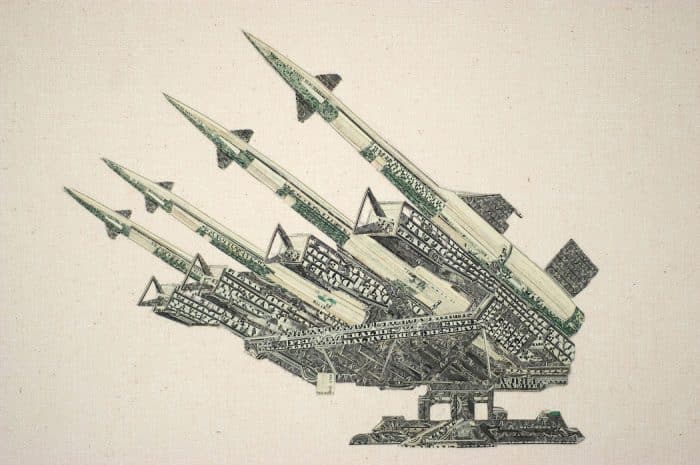“Governments create money all the time. We do that for war.”
“This whole notion that you run government like you run a household…is a complete myth”
Economist Prof Mariana Mazzucato tells #Newsnight Government’s should address social issues through taxhttps://t.co/P0zxS1DNGF pic.twitter.com/I6NLtXgDqN
— BBC Newsnight (@BBCNewsnight) March 6, 2023
This is the argument for more money printing, and perhaps unlimited money printing, recently advanced by Professor Mariana Mazzucato on prime-time BBC.
Channeling Warren Mosler, the godfather of modern monetary theory, Dr. Mazzucato argues against “austerity”—by which she means any natural restraints on government spending. In order to spend, sovereign states need not “earn” tax revenue like a household must earn money, nor do they need to borrow.1 There is a third option: they can print new money at will and enjoy the profit of seigniorage. Just look at Germany, she says approvingly, which recently conjured up €100 billion by executive edict for the war effort in Ukraine!
She certainly is correct that governments print money to pay for wars. America was effectively born into debt during the Revolutionary War, and borrowed/printed money for every war thereafter.
But beyond that she is entirely and embarrassingly wrong. The fundamental reality is that more money does not create any new goods or services in the economy. Money is not wealth. Wealth is productive capacity; the ability to create actual goods and services. Germany and the European Central Bank can create euro stretching to the moon, but that will not produce a single missile or aircraft for the Ukrainians.
Actual production requires the allocation of real resources and real capital. Resource allocation requires choices, whether made by political edict or in the marketplace. In both cases there are inherent opportunity costs to not allocating those resources and capital to other uses. Politics doesn’t magically eliminate tradeoffs. Resources are scarce even when money is not.
A case in point, courtesy of economist Peter Schmidt: “During WWII, the Germans fielded an airplane that made every other aircraft obsolete—the ME262. Even though the German government faced no limits on how much currency it could create, it couldn’t conjure into existence the fuel the planes needed.” In fact, the Germans used oxen to put this most advanced fighter in takeoff position to save fuel!
One gets the sense that all of modern economics is dedicated to refuting Say’s law. The melding of economics and politics promises the proverbial free lunch, where demand creates its own production. Mazzucato is a worthy exemplar of this thinking.
An economist at University College London, Mazzucato wrote an oxymoronically titled book, The Entrepreneurial State. Not surprisingly, she urges greater “investment” by governments to innovate where the private sector supposedly cannot or will not. She is also a graduate of the New School for Social Research, an institution which truly lives up to its radical progressive history. Only of its early leading lights, the noxious reformer John Dewey, was a particular bête noire in Murray Rothbard’s critique of postmillennial pietism.
Of course, neither Mazzucato’s background nor her political views alone negate her arguments. But it is worth noting how the Left consistently elevates its radicals and how mainstream outlets like BBC are entirely comfortable featuring them. This only works one way. We cannot imagine a scenario where BBC interviews Per Bylund on the topic of entirely eliminating central banks in favor of private money. Yet Mazzucato’s MMT prescription for almost unlimited political provision of money is at least as radical relative to the status quo in monetary and fiscal policy.2
But money creation is not magic. It certainly does not create any new wealth, and in fact destroys wealth by directing resources toward inherently inefficient (nonmarket) uses. It benefits early recipients and the political class at the cost of higher prices and terrible distortions in the invaluable structure of production which makes the West so wealthy.
Progressives of all political stripes would happily put America and the West on a permanent wartime footing. Mazzucato and her contemporaries are political people, and politics is war by other means. Inequality, climate change, racism, transphobia, pandemics, and a host of other issues—none of which ever should have been politicized—are now tantamount to battlefields. War costs money, and magic economics wants us to believe national treasuries and central banks can foot any bill.
______
Answer: The federal government taxes to regulate what economists call “aggregate demand” which is a fancy word for “spending power.” In short, that means that if the economy is “too hot,” then raising taxes will cool it down, and if it’s “too cold,” likewise, cutting taxes will warm it up. Taxes aren’t about getting money to spend, they are about regulating our spending power to make sure we don’t have too much and cause inflation, or too little which causes unemployment and recessions.
2. And when it comes to showcasing women in the male-dominated field of economics, only left-wing women receive attention or airtime: Lael Brainard, Janet Yellen, and Stephanie Kelton, for example.
Reprinted with permission from Mises.org.


